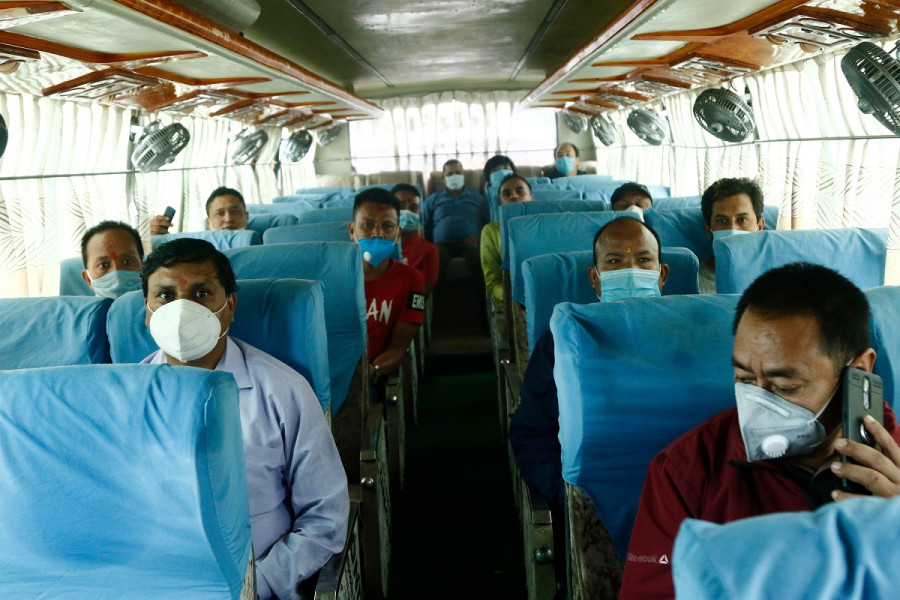Valley
Valley public vehicles are not complying with health and safety protocols
Passengers are at risk of being infected with coronavirus as government agencies blame one another for lax monitoring of public transport vehicles in the city.
Anup Ojha
Anuj Bagale commutes to his work on a public vehicle. These days though boarding a bus gives him the anxiety that he might catch the coronavirus.
But the 18-year-old who works at a pharmacy in Baluwatar has no other choice for a safe commute because he does not own a personal vehicle.
“I get gripped by the fear that I might catch the virus whenever I take the bus these days,” said Bagale, who lives in Lokanthali.
His fear is not irrational. Many public vehicles in Kathmandu Valley have not been following the Covid-19 health and safety guidelines, and there is no one to monitor them.
“None of the buses I’ve boarded so far have hand sanitiser and they are usually crowded during the evening even though the government has announced one passenger per seat rule,” said Bagale.
To offset the financial loss of public vehicle operators under the one passenger per seat rule, the government has allowed them to raise the transport fare by up to 50 percent. The transport operators have increased the fare—in some cases by more than 50 percent— but they have not been implementing the Covid-19 health and safety measures.
Bagale says he has been spending Rs 110 daily on bus fares these days, and in return he has not been getting the services expected of the bus operators.
Shankar Parajuli shares Bagale’s sentiment regarding the bus fare hike and the disregard shown by the bus operators when it comes to ensuring the passengers’ health and safety.
The 37-year-old commutes between Satungal and Ratnapark for his job, and he fears that one of these days he might contract the coronavirus from one of the crowded buses.
“Buses are charging up to Rs 50 from what used to be Rs 20 in normal times. But we, passengers, are not seeing any commitment from the bus operators that they have taken all necessary precautions and measures to minimise the risk of coronavirus infection inside their vehicles,” said Parajuli.
According to the Department of Transport Management, the minimum bus fare at the moment is Rs 21. But many passengers the Post spoke with said that they were being charged more than the set rate.
Gogan Hamal, director general of the department, however, claims that there has not been any fare gouging.
If some vehicles have been charging high fare and not been following the health and safety rules, Hamal says it is the responsibility of the traffic police to take necessary actions.
“Traffic police must take account of this issue. Besides, people who travel on public vehicles also need to be serious,” he told the Post.
Metropolitan Traffic Police Division says it has been monitoring the public vehicles.
“On Monday alone, we caught 114 public vehicles for violating the rules. We let them off with a warning, but we will soon start penalising them,” said Rameshwor Yadav, spokesperson at the division.
The division has set up a meeting with the transport operators on Tuesday to discuss the matter regarding fare and health and safety measures.
While public transport operators are being accused by passengers of charging exorbitant fare and disregarding the health and safety rules, the coronavirus cases are increasing in Kathmandu Valley.
According to the Ministry of Health and Population, the Valley recorded 674 new infections on Monday. Of them, 538 were confirmed in Kathmandu, 74 in Bhaktapur and 62 in Lalitpur. As of Monday, the number of cases in the Valley has reached 17,290.
“There is a higher risk of the virus spreading inside enclosed space like public vehicles, particularly if they are crowded. The bus operators as well as passengers should be careful,” said Dr Sher Bahadur Pun, a virologist at the Sukraraj Tropical and Infectious Disease Hospital in Teku. “The government should also strictly enforce the health and safety rules in order to reduce the infection risk.”
However, none of the concerned government agencies seem to be bothered about public vehicles violating the health and safety rules. The local governments in the Valley have squarely placed the blame on the federal government and the district administration offices of Kathmandu, Lalitpur and Bhaktapur.
Madan Sundar Shrestha, mayor of Madyapur Thimi and the secretary of the Kathmandu Valley Mayors’ Forum, says the coronavirus crisis in the Valley was invited by the government by not listening to the forum’s advice.
“We had requested the government not to lift the lockdown and seal all entry points to the Valley, but it did not listen to us. Now everything is open and everything is messed up. None of the government’s protocol has been implemented,” Shrestha told the Post.
“The three chief district officers of the Valley and other senior government officials should be responsible for the looming catastrophe, because they have decided to resume the public vehicles, a decision that is sure to exacerbate the Covid-19 situation.”
In the middle of this blame game are people like Bagale and Parajuli who have no choice but to take public vehicles to get to work every day.
“I make Rs 8,000 in a month and nearly half of that money is going on bus fare these days. What’s the point of raising the fare if the passengers do not feel safe?” he said. “No one has been monitoring if the public vehicles are following the health and safety rules.”




 18.12°C Kathmandu
18.12°C Kathmandu.jpg)













